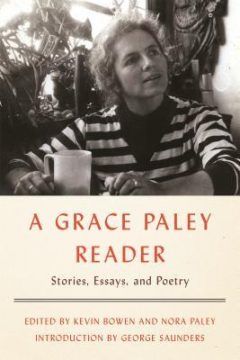Maggie Doherty at The Nation:
 A Grace Paley Reader helps to return the writer to her historical moment, to the specific conditions that shaped her life as an artist and activist. The chronology in the back of the book pairs Paley’s literary publications with her political activities. A sampling: “1959: The Little Disturbances of Man published by Doubleday. Joins in organizing antinuclear protests and with protests against air-raid drills in schools.” “1969: Travels to North Vietnam with a small delegation of peace activists to receive three U.S. prisoners of war. ‘Distances’ is awarded O. Henry Award.” “1978: Arrested in antinuclear demonstration on White House lawn, receives six-month suspended sentence. Publishes ‘Somewhere Else’ in The New Yorker.” In Paley’s life, as in her fiction, the boundaries between the personal and the political, the domestic and the worldly, were remarkably porous. Politics entered her fiction as naturally as a familiar neighbor might step across the threshold of her apartment. For quite some time, critics have heralded Paley because of the compact precision, humor, and idiom of her prose. But equally important to our understanding is her deep engagement with the social and political movements of her time—and how this engagement, this passionate worldliness, defined her fiction.
A Grace Paley Reader helps to return the writer to her historical moment, to the specific conditions that shaped her life as an artist and activist. The chronology in the back of the book pairs Paley’s literary publications with her political activities. A sampling: “1959: The Little Disturbances of Man published by Doubleday. Joins in organizing antinuclear protests and with protests against air-raid drills in schools.” “1969: Travels to North Vietnam with a small delegation of peace activists to receive three U.S. prisoners of war. ‘Distances’ is awarded O. Henry Award.” “1978: Arrested in antinuclear demonstration on White House lawn, receives six-month suspended sentence. Publishes ‘Somewhere Else’ in The New Yorker.” In Paley’s life, as in her fiction, the boundaries between the personal and the political, the domestic and the worldly, were remarkably porous. Politics entered her fiction as naturally as a familiar neighbor might step across the threshold of her apartment. For quite some time, critics have heralded Paley because of the compact precision, humor, and idiom of her prose. But equally important to our understanding is her deep engagement with the social and political movements of her time—and how this engagement, this passionate worldliness, defined her fiction.
more here.
